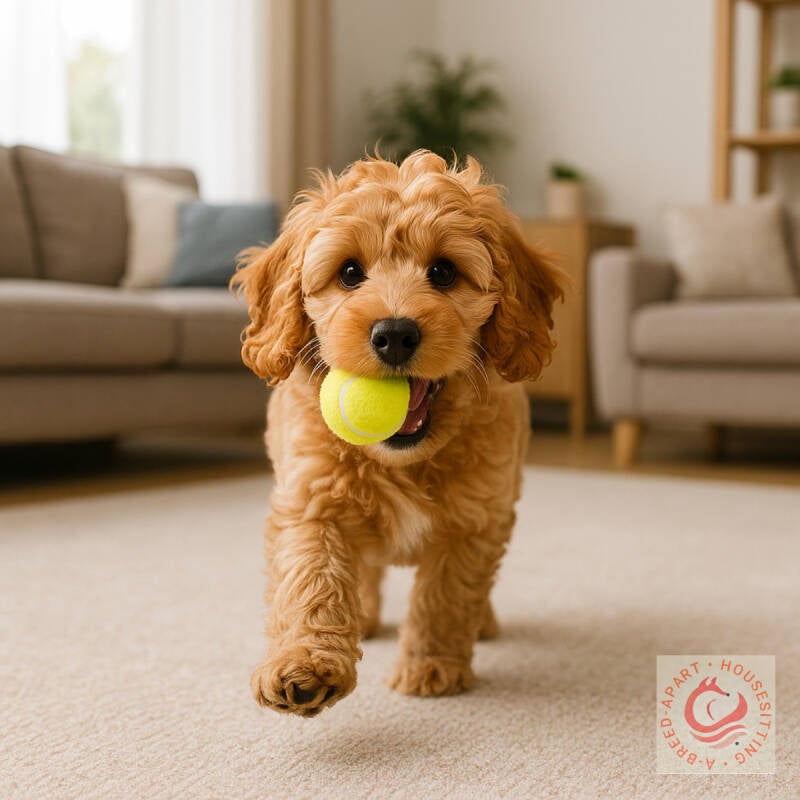Why Cockapoos Make Irresistible Country Companions
A Cockapoo is what happens when clever meets cuddly. Born from the cross between a Cocker Spaniel and a Poodle, this breed has quickly become one of the UK’s favourite hybrid dogs, and for good reason. Especially well-suited to rural life, Cockapoos are bubbly, brainy, and bursting with affection. However, beneath that mop of curls is a dog that craves structure, attention, and mental stimulation to thrive.
If you're considering welcoming a Cockapoo into your countryside home, here’s everything you need to know.

Temperament: Smart, Silly and Sweet-Natured
Cockapoos are the comedians of the canine world, delighting in antics, mischief, and making their humans laugh. They tend to inherit the Poodle’s intelligence and the Cocker Spaniel’s people-pleasing nature, making them both trainable and eager to connect.
They're sensitive souls, too. These dogs thrive on human interaction and are emotionally in tune with their families. While their sunny disposition makes them fantastic therapy or companion dogs, they can be prone to separation anxiety if left alone for too long.
Ideal Living Conditions: Room to Romp and a Family to Dote On
Cockapoos do best in environments where they can stretch their legs and be part of the family routine. Though adaptable to smaller homes, Cockapoos truly thrive in rural or semi-rural settings with a secure garden.
They’ll gleefully scamper alongside you on walks, explore woodlands, and come home ready to cuddle. However, don’t let their compact size fool you; they have lots of energy and need consistent physical and mental exercise.
Health Notes: A Generally Robust Mix, But Know the Risks
As a hybrid breed, first-generation Cockapoos may benefit from some hybrid vigour, though this benefit can diminish in multigenerational crosses. Even with this hybrid vigour, they’re not without potential health concerns. Some of the more common issues include:
- Ear Infections: Those floppy, furry ears can trap moisture. Regular checks and cleaning are essential.
- Hip Dysplasia: Especially if they come from a larger Poodle line.
- Progressive Retinal Atrophy (PRA): A hereditary eye condition, so always check for clear health screening from breeders.
- Allergies and Skin Sensitivities: Often triggered by food or environment.
Regular vet check-ups, a healthy diet, and keeping them at a healthy weight will go a long way to keeping your Cockapoo bouncing.

Training Tips: Clever, But Can Be Cheeky
Training a Cockapoo is a rewarding experience. Their intelligence makes them fast learners, especially with positive reinforcement methods. However, their mischievous streak and high sociability mean you need to keep sessions short, varied, and fun.
Start training early and don’t skip socialisation, especially in rural settings where livestock, farm machinery, and unfamiliar dogs might otherwise cause overexcitement or anxiety.
Tips for success:
- Keep it light-hearted and upbeat.
- Use treats wisely; these dogs can become food-motivated to the point of cheekiness.
- Avoid harsh correcting. They’ll shut down or become anxious.
Crate Training Tip:
Crate training is a commonly used and recommended tool for managing anxiety and giving the dog a safe space.
Family-Fit: Made for Closeness
Cockapoos are outstanding family dogs. They’re usually great with children, gentle with elderly relatives, and can often get along with other pets—especially if raised together. Their social nature means they’ll want to be wherever the action is, whether that’s a picnic on the green or a lazy Sunday in the kitchen.
Even so, young children should always be supervised around any dog. Teach kids how to interact respectfully towards your Cockapoo, and you’ll have a loyal companion who slots in like one of the clan.
Common Mistakes Made by First-Time Owners
Despite their charm, Cockapoos aren’t maintenance-free. First-time owners often stumble by:
- Underestimating their grooming needs: To prevent matting, Cockapoos need brushing at least 3 or 4 times a week and professional grooming every 6–8 weeks.
- Ignoring early socialisation: They can become yappy or anxious around unfamiliar things.
- Leaving them alone for too long: Separation anxiety is real. Dog behaviour experts recommend no more than 4 hours alone at a time for an adult Cockapoo. Puppies shouldn’t be alone for longer than 2 hours, depending on their age.
- Overindulging bad habits: Because they’re so cute, it’s easy to let them rule the roost!
Socialisation Needs: Early, Often, and Ongoing
Cockapoos are friendly, but without structured socialisation, their excitement can become overwhelming. From a young age, introduce them to:
- Other dogs of various sizes
- Noisy rural machinery like quad bikes or tractors
- Livestock from a safe distance
- People in hats, children with scooters, postal workers

Proper exposure ensures they’ll grow into confident, calm dogs who can go anywhere with you—village fetes, dog-friendly pubs, or farmers' markets included.
Summary: Spirited, Smart, Sweet, And Not for the Lazy
Cockapoos are a true joy, but only for those willing to match their energy, attend to their grooming, and meet their emotional needs. In return, you get a bright-eyed, tail-wagging shadow who thinks your every move is the best idea ever.
If you're a rural homeowner seeking a sociable, fun-loving, and intelligent canine companion who adores company and adventure, a Cockapoo could be your perfect match.


Add comment
Comments